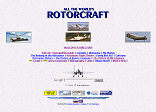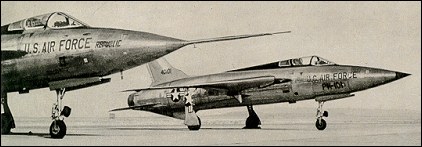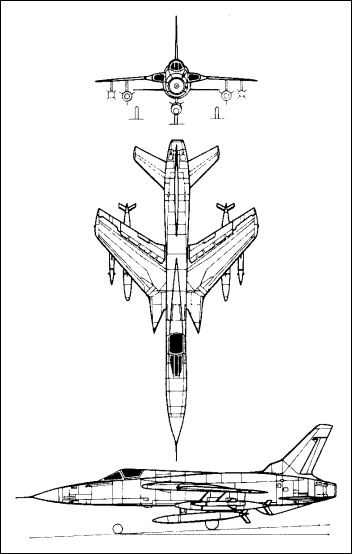|
| The Republic F-105 Thunderchief, or company model AP-63, was conceived in 1951 as a nuclear strike aircraft with an internal bomb bay, but won renown for hauling bombs externally in a conventional war. Alexander Kartveli's design team originally intended a straight fuselage for the craft but, after seeing NACA data assembled by Richard Whitcomb, was won over by the wasp-waist or 'area rule' configuration which enhanced transonic flight performance. At first intended for the Allison J71 engine and powered in prototype form by the Pratt & Whitney J57, the F-105 attained its successes with the 7802kg thrust Pratt & Whitney J75-P-19W turbojet which provided 11113kg thrust with afterburning. Its mid-mounted wing, swept 60 degrees, the F-105 stood high on its tricycle gear and was a big, brutish machine, yet it conveyed an image of sleekness and grace slicing through the air. Development of the aircraft was by no means without its difficulties, and things had only begun when two J57-powered YF-105As commenced flying 22 October 1955, soon followed by 15 aircraft designated JF-105B and F-105B for test programmes.
Production F-105Bs, long delayed by development problems, began to roll from Republic's Farmingdale line during 1958 and the USAF accepted its first machine on 27 May 1958. The 335th Tactical Fighter Squadron, temporarily moved to Eglin AFB, Florida, began to work up in the new aircraft only to find that, given its complexity and production slippages, it would not become operational until 1960. Meanwhile, a two-seat strike variant, the F-105C, had reached the mock-up stage but was not built. Though technical problems persisted and critics were calling the 'Thud' a maintenance nightmare, Republic proceeded with the F-105D variant which afforded true, all-weather capability by introducing General Electric FC-5 fully integrated automatic flight fire-control system. The F-105D's fuselage was lengthened by 0.381m. Some 610 were manufactured, and first flight took place at Farmingdale 9 June 1959. The F-105D model soon equipped all three squadrons of the 4th Tactical Fighter Wing at Seymour Johnson AFB, North Carolina. United States Air Forces in Europe (USAFE) were the first overseas recipient of the F-105D, the 36th TFW at Bitburg AB, West Germany re-equipping from 12 May 1961 and the 49th TFW at Spangdahlem soon following. In the early 1960s, with a war growing in Asia,
F-105Ds joined the 18th TFW at Kadena AFB, Okinawa.
The F-105D was by now a proven ordnance-carrier. With multiple ejector racks (MER), it could carry an impressive load of external fuel, ECM gear, and eight 340kg bombs on long-range missions. The F-105D could also operate with the Martin AGM-12 Bullpup air-to-surface missile, which was to prove remarkably ineffective against 'hard' targets in Vietnam and would be observed bouncing off the Thanh Hoa Bridge. In addition, the F-105D model could carry 70mm rocket pods, napalm canisters and the AIM-9 infra-red (IR) air-to-air missiles, while its integral M61A1 Gatling-type 20-mm cannon proved invaluable in the dual roles of air-to-air combat and air-to-ground strafing. A late-model variant of the F-105D was the F-105D T-Stick II fitted with additional avionics which bestowed all-weather bombing capability, housed in a prominent dorsal fairing extending along the spine of the fuselage to the tail.
The F-105E was another two-seat variant that was not developed. A two-seat Thunderchief was inevitable, however, and in May 1962 Republic proceeded with the F-105F. This model, which made its first flight 11 June 1963, was some 900kg heavier as well as slightly longer than earlier Thunderchiefs in order to accommodate the second crewman in tandem; 143 F-105Fs were delivered and 61 were later reconfigured for the electronic warfare or 'Wild Weasel' role in Vietnam, at first under their original designation and later as the F-105G.
The F-105D, F-105F and F-105G all fought in North Vietnamese skies, the F-104D model fighter-bomber so extensively that over half of the 610 built eventually fell to Hanoi's air defences. After withdrawal from South East Asia in 1969-70, the Thunderchief soldiered on in Reserve and Air National Guard units, eventually flying its final sortie in 1984. At one time no fewer than 14 USAF and 11 ANG squadrons operated the type, which was built to the extent of 833 examples. Perhaps because of its complexity, no F-105 was ever exported.

| MODEL | F-105D |
| CREW | 1 |
| ENGINE | 1 x Pratt & Whitney J75-P-19W, 76.5kN |
| WEIGHTS |
| Take-off weight | 23967 kg | 52838 lb |
| Empty weight | 12474 kg | 27501 lb |
| DIMENSIONS |
| Wingspan | 10.59 m | 35 ft 9 in |
| Length | 19.61 m | 64 ft 4 in |
| Height | 5.97 m | 20 ft 7 in |
| Wing area | 35.77 m2 | 385.02 sq ft |
| PERFORMANCE |
| Ceiling | 12560 m | 41200 ft |
| Range w/max.fuel | 3846 km | 2390 miles |
| ARMAMENT | 1 x 20mm cannon, 6350kg of weapons |
| Swagik, 27.02.2025 22:33 I'm doing this for my skibidi brainrot assignment. I go to rizz university. My prof name is diddy. reply | | Mark Wessel, e-mail, 09.02.2023 19:51 I also flew several times in the backseat with Roger Strand. reply |
| Robert J Walker, e-mail, 21.09.2022 07:47 Worked on F105D' as an AFCS system Tech at McConnell AFB when they first arrived form the factory and other AF Bases October 1963 to November 1965. 388 th TFW and then the 23rd TFW (Famous Flying Tiger). 1965 to 1966 Korat Thailand and back to McConnell. June 1967 to NovemberJune 1968 back to Korat. Worked six months in maintenance debriefing and flight line maintenance. Helped looking for anti personal bombs after a. Nickel crashed on take off at the end of runway. Also the Bomb dump exploded cased by a forklift that dropped a bomb causing it to crack open and set off by a spark from the fork lifts electrical system. Back to McConnell AFB from June 1968 to September1972. Worked both in Maintenance Debriefing, flightline maintence, and maintenance control in the 4519 TFS that was training Pilots for SEA. Worked flight line maintenance and maintenance control in the 563rd TFS F105 T stick two's. Worked with Ron Hays from sheet metal in the 4519 th. Is there any one around that may remember either one of us. reply | | Anonymous, 26.07.2022 18:17 The F-105 has frequently been criticized for being too large and clumsy to go up against Migs over Vietnam. However, although the Thunderchief was labeled as a "fighter" and was given a fighter designation (F-105), it was really a bomber. The F-105 even had an internal bomb bay. To criticize the "Thud" for being too large for a fighter, and for not performing as well as other contemporary fighters, is to completely miss the point of this aircraft. The aircraft against which the Thunderchief competed for an Air Force contract was not the F-4 Phantom II, the F-101 "Super Sabre" or the F-104 Starfighter, but the North American F-107 "Ultra-Saber", an aircraft which never entered production. Both the F-105 and F-107 were designed specifically for the purpose of delivering tactical nuclear bombs, NOT for air-to-air dogfighting against Mig-21s. reply | |
| | Dale V DeBrito, e-mail, 01.02.2021 21:32 I worked on the Fire Control System (radar /bomb computer /gunsight) at Yokota and helped to make the first Wild Weasels. Many of us in the radar shop modified the R-14A radar, and went TDY to Ubon RTAFB Thailand with Ryan's Raiders to maintain them. reply | | Jim DeVoss, e-mail, 18.05.2020 00:19 Flew Thuds 1968-1969. Shot down over Laos on my 71st mission on 16 June 69 while flying as Kingfish1. Film taken during my rescue was used in the award winning AF documentary "Faces of Rescue" which told the story of Air Rescue and Recovery in Southeast.
Anyone interested in the "details" can visit:
www.ThanksForMyEverything.com
If you do, hope you find it interesting! My experiences with the Thud were exactly that; oh to be able to do it (almost) all again!!
Just saying..... reply | | Al Roehl, 19.02.2018 05:05 Looking for David A. Smith who was on a two man load crew with me , on the M-61 gun on the 105 in 1968 in Takhli Thailand. I found him on some old papers l found and all I have is a service number 11797398. Would like to hear from him. reply | | Bob Boyd, e-mail, 24.12.2017 04:02 I was on F105D program from 1960 to 1965 as a tech instructor on the AFCS. Served a tour on Okinawa with the 18th TFW changing over from F100's. Col. Francis Gabreski was the F100 Wing CO. Cant recall the 105 Wing CO's name. reply | | Carl Grimm, e-mail, 19.10.2017 23:00 I worked on line service part time at the Hutchinson airport from Sept. '66 to Sept. '69. The 105s from McConnell would fly training missions to Smokey Hill and then on their way home many would fly approaches at Hutch. You could always tell their last pass as they would really "light them up" and rattle the hanger windows headed
SE to Wichita. Being ex-USAF myself (Ground radar maint., AC&W and SAGE), I always enjoyed watching them. reply | | Ron_Mead, e-mail, 18.10.2017 03:29 Worked at McConnell 72 to 73 then went to George with the 561st. Then F-105 loading until 78 and left for Germany. It was a great plane to work on. Left just before they started going to the guard and was giving out incentives rides to anybody reply | | David Geryak, e-mail, 27.06.2017 00:25 I worked the Thud from Jan 66 to April 66 and moved with the 13thTFS MMS to Korat from late April to may of 67. I spent a lot of time at the arm /de-arm ends of the runway. Spent many hard hours on the line also loading her.
Does anyone who was there on the flight line during that time frame remember a thud coming in with the centerline MER rack front latch open and the rear still latched and the front of the rack was angled down. He made a miraculous landing and A1C Dudley and I were at the de-arm to meet him. Does anyone remember that incident among many others that occurred. If you have any information on it or know approximately when it happened please let me know.
Also does anyone know were AO was awarded from Korat? reply | | George Haloulakos, e-mail, 31.12.2016 01:43 For a first-hand account of the Republic F-105 Thunderchief in combat during the Vietnam War, please read the book "The Thunder in Me" by Col. John Wright (published 2015). Col. Wright flew 140 missions over North Vietnam in the F-105 and provides an informative, educational and inspiring retrospective on this historic aircraft from the perspective of a strike pilot. Prior to flying the F-105, Col. Wright flew 100 missions over North Korea in the F-84 and later registered about 1,000 hours in the Convair B-58 Hustler. Chapter 10 is my favorite part of this book due to its focus on the F-105 Thunderchief and Col. Wright's narrative that literally places the reader in the cockpit at the height of the Vietnam War. This book affirms why the F-105 Thunderchief is a testimony to American exceptionalism. reply | | Craig Ja-Moo Jarvis, e-mail, 05.11.2016 03:01 Okinawa-Kadena. 1964 /65 418th MMS Load Crew #6 for the F-105 Thunderchief. Lots of time in Korat & Taklli Thailand supporting our ground troops in Vietnam. Bangkok was our R&R. Trying but good times back then, would returnin a heart beat. reply |
| Ted Tedesco, e-mail, 23.07.2016 09:00 I served with USAF and worked on the ASG-19 FCS on the F-105D at Nellis AFB from Jan-63 to Dec-65. Are any of you guys I worked with and played sports with still around? reply | |
| | Tom (Rossum-) Septembre, e-mail, 13.04.2016 19:35 I left a previous comment regarding my tour as a Crew Chief with the 34th TFS F-105 67-68 Korat, Thailand. Dennis Gurnee was also a Crew Chief at Korat the same time. We are now in touch. If anyone remembers him and wants to get in touch, email me and I will pass it on to him.
Foun more pictures of the flight line, maintenance headquarters, our open air rooms and the bar ANY PLACE. reply | | Thomas, e-mail, 13.11.2015 13:51 I am trying to contact the following people who posted about the F-105 here but the email links do not work. Could those named in the following list please email me at: thomasdocherty@tiscali.co.uk
Mike (Tug) Hogan
Don Bequette
Gary Retterbush
Alan Bricker
Raymond Boback
Thomas Bomback
Richard A Felder
Len Travaille
C. E. Bud Williams
Ed Langham
Gary Ray
Hal Shrum
Sal Orlando
Ron Wallace
Beetle Bailey
Gene Du Boff
David Burns
Larry Brantl
Paul Soucy
Roy Pagnini
BOB KINDER
Thanks guys.
Tom Docherty reply | | Thomas, e-mail, 12.11.2015 19:02 Well, I thought I had it worked out but the 'email' link highlighted in blue on the visitors comments page for the F-105 does not work. Tried several individuals but nothing happens. Anyone help with that? reply | | Tom Docherty, e-mail, 12.11.2015 18:58 Disregard my last post, I worked it out! reply | | Tom Docherty, e-mail, 12.11.2015 18:55 How do I make email contact with the F-105 men who have added comments here on this site? reply | | Tom Docherty, e-mail, 08.06.2015 13:42 I am currently researching the F-105 and hope to contact pilots who flew the type with the 36TFW and 49TFW in USAFE prior to Vietnam and with ANG units post Vietnam. Any help would be much appreciated. reply |
|
Do you have any comments?
|
| 
COMPANY
PROFILE
All the World's Rotorcraft
|




 Craig Ja-Moo Jarvis
Craig Ja-Moo Jarvis Gene Greninger
Gene Greninger




type type
reply